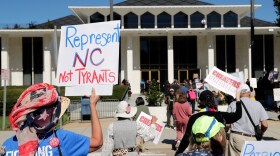One thing is clear: the U.S. Supreme Court will not interfere with North Carolina's congressional district map ahead of this year's midterm elections.
What is far from clear is what, if anything, will the conservative court do when it comes to the larger issue of whether state courts have any authority to interfere with the drawing of congressional district lines.
That question resides at the heart of a recent U.S. Supreme Court filing by Republicans in control of the North Carolina General Assembly. GOP lawmakers, led by state House Speaker Tim Moore (R-Cleveland), sought an emergency stay asking the court to block use of a recently-drawn congressional map for the 2022 midterms.
Do State Legislatures Have Sole Authority To Draw Congressional Maps?
The issue, GOP lawmakers argue, is that the Article I, Section 4, of the U.S. Constitution, known as the Elections Clause, says: "The Times, Places and Manner of holding Elections for Senators and Representatives, shall be prescribed in each State by the Legislature thereof."
Therefore, the argument goes, state courts may not meddle in issues of regulating federal elections, including the drawing of district maps.
The map currently in place for North Carolina's 2022 congressional races was drawn by three special masters appointed by a state trial court. It was a process ordered by the North Carolina Supreme Court after a 4-3 majority, with Democratic justices overruling a Republican minority on the Court, found district maps drawn by the legislature's GOP majority to be unconstitutionally gerrymandered with extreme partisan bias.
The state Supreme Court OK'd replacement maps for the North Carolina House and Senate drawn by lawmakers but rejected their congressional map as still being too skewed to favor Republicans. Instead, the Court approved the special masters' interim congressional plan, which is in place for the 2022 midterms only.
Under the interim map, Republicans are expected to win seven congressional seats this November, with Democrats taking six and one seat remaining a toss-up. Based on 2020 census data, North Carolina picked up a 14th congressional seat.
'Independent State Legislature' Doctrine Could Get Day In Court
Justice Brett Kavanaugh joined the U.S. Supreme Court majority in denying the North Carolina GOP lawmakers' request for emergency intervention to block use of the 2022 remedial map saying—especially with North Carolina's primaries set for May 17—it was too late for federal courts to order a new map for this year's midterm elections.
But, concurring with three other conservative justices who dissented, Kavanaugh agreed that the issue of whether the federal Constitution's Elections Clause prohibits state courts from intervening in issues of congressional redistricting is important and should be taken up by the High Court, indicating the requisite number of four justices exists to entertain such a case in the future.
I would say the door was left very wide open on the possibility of entertaining another request by the legislative Republicans to resubmit the case before the U.S. Supreme Court and have the case reviewed on its merits.Michael Bitzer, Catawba College political science professor
"I would say the door was left very wide open on the possibility of entertaining another request by the legislative Republicans to resubmit the case before the U.S. Supreme Court and have the case reviewed on its merits," wrote Catawba College Political Science Professor Michael Bitzer, in an email response to WUNC.
When, and if, this happens is a question of timing and strategy, added Bitzer, author of "Redistricting and Gerrymandering in North Carolina: Battlelines in the Tar Heel State."
"The legislature wants the nation’s highest court to ratify the federalism/legal doctrine of Independent State Legislature that would state that all legislative power belongs exclusive to the state legislature—no federal judges, no state judges, no executives can share that power," Bitzer wrote.
In response to Monday's ruling by the U.S. Supreme Court, state Senate President Pro Tem Phil Berger (R-Rockingham) said in a statement that GOP lawmakers were "disappointed" with the court's decision "allowing elections under a congressional map drawn by the conflict-ridden special masters to continue."
The state trial court that reviewed the replacement maps submitted by lawmakers appointed three former jurists to assist the judges as special masters.
One was former state Supreme Court Justice Robert Orr, a Republican who publicly broke with the GOP in response to the party's embrace of Donald Trump. He is now registered as unaffiliated.
Robert Edmunds, a registered Republican, also was appointed as a special master and, like Orr, served on the North Carolina Supreme Court from 2000 to 2016.
The third special master was registered Democrat Thomas Ross, a former UNC System president and Superior Court judge.
Senator Berger's statement indicates GOP leaders are considering taking the central issue of their argument back to the nation's highest court.
"While we're focusing on the 2022 elections," Berger's statement said, "we will continue to evaluate this decision and next steps in this case."
Since the interim congressional map is in place for the 2022 midterm elections only—and since there is no prohibition on redrawing Congressional maps at any time, whereas the state Constitution prohibits mid-decade redistricting for state legislative districts—Republican lawmakers certainly will take a shot at drawing a new Congressional map for 2024 and beyond, assuming they retain their legislative majority.
Furthermore, the GOP hopes a red wave in the midterms will help Republicans sweep two state supreme court races up for grabs giving them a majority on the court.







